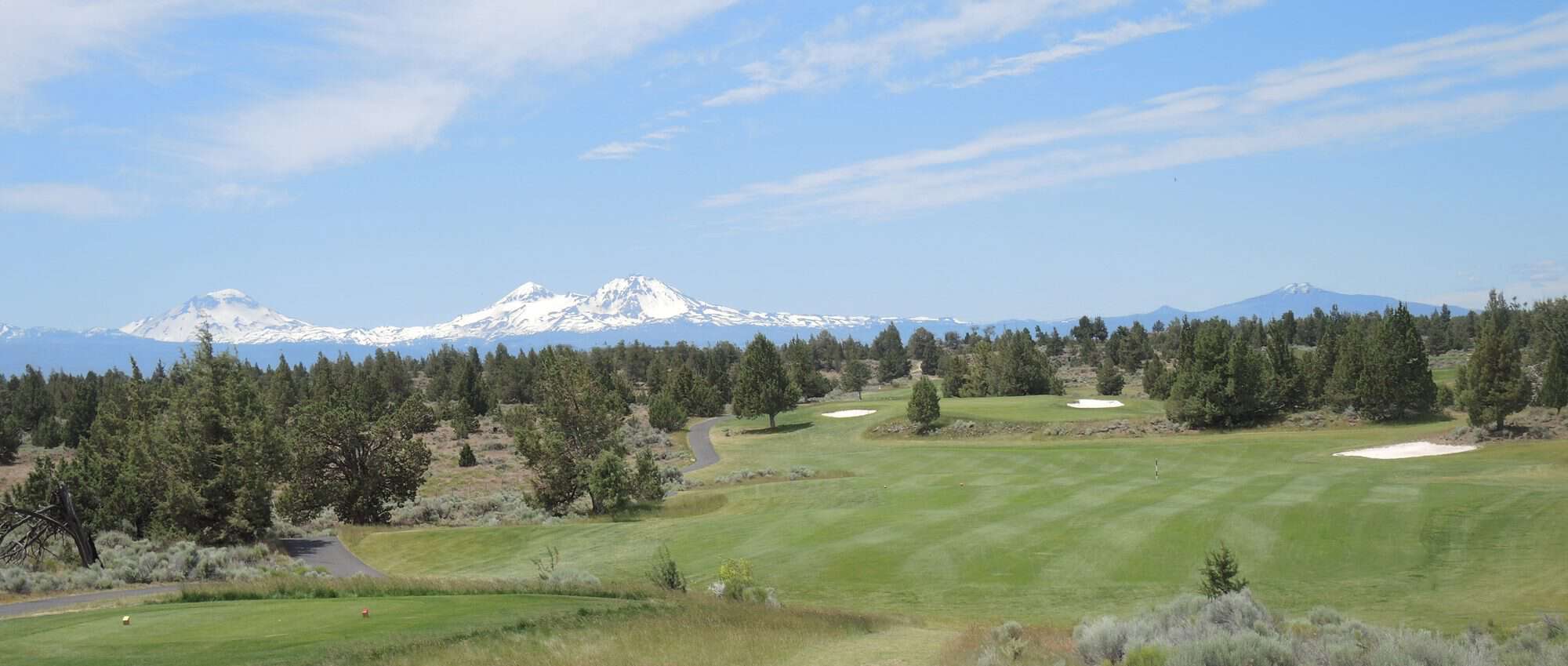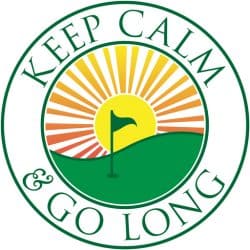“The program changed the entire direction of my life, both in terms of financial support and connections.” Isaiah Troung, University of Oregon Class of 2018, grew up in Portland
“The scholarship changed my life and may have saved my life.” Todd Williams, Class of ’88, Portland
“I don’t know where I would be without the scholarship. . . . It is so much more than the financial aspect. You become part of a community with resources and life-long connections.” Saul Galvan, Class of ’26, Chicago
“The program allowed me to grow up into myself. It changed my life and let me be a role model and help others.” Lilly Varner, Class of 2025, Portland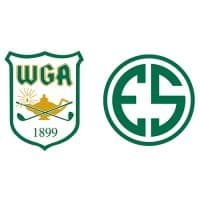
These quotes are about the Evans Scholarship Program. The Evans Scholarship is a full (yes, full – all four years) tuition and housing college scholarship for students who have worked as caddies (or at least have done work in or around a clubhouse), who have good grades and high character, and have limited financial means. It is one of the best college scholarship programs in the country and is not that well known. The program is active in Oregon, with a growing number of applicants from Oregon. The reason why I investigated the program is because caddying is key to being selected for the scholarship. What I have learned is that the Evans Scholarship Program is transformational, not only for the students who get to be Evans Scholars, but maybe also for the game of golf.
Brief History
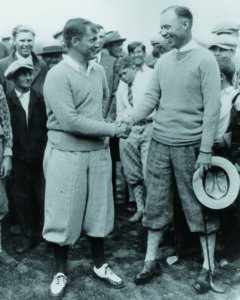
In 1929, acclaimed amateur golfer Charles “Chick” Evans Jr. asked the Western Golf Association (or WGA, located outside of Chicago, Illinois) to administer a fund he had established to send deserving caddies to college. Mr. Evans learned the game of golf while caddying. As he became successful in golf and life, he believed that there were many hard-working caddies who were academically inclined but did not have the financial wherewithal to go to college. Looking back on the program in 1969, he said:
“No one more than I knew that caddies have a love for wisdom. My mother and father believed that education is a vital factor in determining what kind of nation America will be. And so, farsightedly, these thoughts of ours were molded into America through college scholarships for deserving caddies . . ..”
The WGA awarded its first two scholarships in 1930, sending caddies to Northwestern University. (Until World War II, all Evans Scholars attended Northwestern.) From that humble beginning, the program has significantly grown in terms of numbers of applicants, schools where applicants are matriculating, and funds available to provide scholarships. As of the 2023-24 academic year, there were 1,130 Evans Scholars enrolled in 24 different universities, and 12,040 students had graduated as Evans Scholars.
Applications are growing (but still seem relatively small to me, given the benefits). In 2018-19 there were 810 applications and in 2022-23 there were 875. As you will see below, granting of the scholarships is not automatic. Nationally, the acceptance rate has hovered around 35 percent (although I do not think that there is any target acceptance rate by the program), with 325 applications being granted in 2022-23.
The foundation that funds the program now receives contributions in excess of $50 million per year. The foundation is funded by many sources, including contributions from members of Par Club that was established by WGA to support the program; contributions by courses, clubs, and individuals; funds from local golf tournament fundraisers; and proceeds from national championships including the WGA championships and the BMW Championship (one of the events in the PGA Tour Playoffs for the FedEx Cup).
The Application Process
Scholarship applications are accepted at the beginning of an applicant’s senior year of high school, as well as from college freshmen (the vast majority of applicants are high school seniors; college freshman that apply are generally those who were denied a scholarship in high school because of something that could be rectified). The deadline for filing the application (which includes supporting documents like evaluations, recommendation letters, transcripts, test scores, a College Scholarship Service (or CSS) profile, and personal essay) is October 15. To qualify, applicants must meet the requirements of having a strong caddie record, excellent academics, demonstrated financial need, and outstanding character. Let’s look at each of those requirements:
- Strong caddie record: Applicants must have caddied or have worked around the clubhouse, regularly and successfully, for a minimum of two years. There is no minimum number of loops (a round of golf where the student serves as a caddy) required, but the applicant should be working at their sponsoring club/course the year they apply for the scholarship (and the more loops the better). The selection committee often looks to see what other applicants in the geographic area have done (how many loops; what other work was done). [Side note: the Evans website has some great videos on how to caddie (and it taught me the best way to rake a trap).] To become a caddie, it is up to the club/course to accept the applicant (the Evans Scholarship Program is not a youth caddie program).
- Excellent academics: Applicants must have completed their junior year of high school with above a B average in college preparatory courses. There is no definition of “college preparatory courses,” but generally the courses are considered AP courses and should be academically rigorous.
- Demonstrated financial need: Applicants must have a need for financial assistance. This is generally shown using tax returns and the CSS profile, an online application used by colleges and scholarship programs to award non-federal institutional aid. Financial need is not a bright line. Evaluators look at the overall situation of the applicant to determine if there is a financial need.
- Outstanding character: Applicants must be outstanding in character, integrity, and leadership, which is generally shown by letters of recommendation and the activities that the applicant is doing other than going to class and doing loops.
[Note that the applicant must still select which college to attend and be admitted in the normal course to be awarded the scholarship.]
If the written application is approved, the applicant then has an interview (generally 20 minutes) before a selection committee made up of program supporters. The panel then takes about a week to deliberate and contacts the applicant the week thereafter.
Once an applicant is awarded a scholarship and is matriculating, scholars must maintain an above 3.0 GPA and be involved (in a positive way) with school activities (and not do anything stupid). The Evans Scholarship Program provides academic, professional, and social resources that help students maintain the needed GPA. The graduation rate for Evans Scholars is a whopping 95 percent. The Evans Scholarship Program also provides career guidance and a massive amount of business and professional connections that assist the scholar after graduation.
Evans Scholarship Program in Oregon
There are 11 facilities that presently actively provide applicants for the Evans Scholarship Program in Oregon: Willamette Valley Country Club, Eugene Country Club, Oswego Lake Country Club, Waverley Country Club, the Portland Park and Recreation golf courses other than RedTail (Eastmoreland Golf Course, the Heron Lakes courses (both the Greenback Course and the Great Blue Course), and Rose City Golf Course), Gearhart Golf Links, Columbia Edgewater Country Club, the Bandon Dunes complex, and Bend Golf Club. (To apply for a scholarship, you do not have to caddie at any of these facilities, but finding a facility that has a caddie program is limited and these facilities have knowledge about the Evans Scholarship Program, which probably really helps in the application process.) As of 2023, there had been a total of 341 Evans Scholars from Oregon. Of these, 250 have attended University of Oregon (who began accepting scholars in 1950). In the 2022-23 academic year, there were 23 applications from Oregonians and 9 of those folks were awarded scholarships. The vast majority of applicants from Oregon stay in Oregon to go to college.
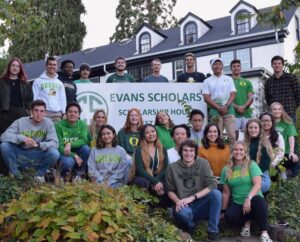
Several universities across the country provide housing specifically for Evans Scholars. The University of Oregon opened its Evans Scholarship House in 2016. It can house up to 38 scholars (I hear, comfortably). Almost all residents are from Oregon, but Evans Scholars from other states have stayed there while going to U of O. The house has Residential Advisors and Faculty Advisors, and has a Scholars’ board providing for self-governance. In the 2022-23 academic year there were 33 Evans Scholars at the House, 29 from Oregon and SW Washington.
The Oregon facilities who have had the greatest number of Evans’ scholars have been: the Portland Parks and Recreation golf courses, through its EAGLE Caddy program (with 77 scholars all time); Waverley Country Club with 66 Evans Scholars; and Bandon with 53 scholars. Note how different these complexes are: muni courses, the oldest private course/club in the state, and a world-renowned golf complex. They each provide a slightly different path to the Evans Scholarship Program, but they all strongly support their caddies and the Evans Scholarship Program. And at none of these places does the potential applicant need to know how to caddie or even play golf.
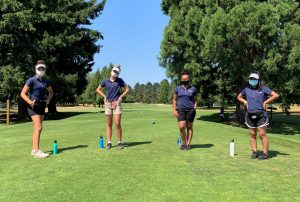
- The EAGLE Caddy Program (Early Adventures in Golf for a Lifetime of Enjoyment) is run by Portland Parks and Recreation. It focuses on currently-enrolled Portland high school freshmen with solid grades from financially disadvantaged families. It is competitive to get in. You have to show good school attendance, have a 9th-grade cumulative GPA of at least 3.25, and the family’s annual income cannot exceed $75,000. The applicant must agree to work at least 20-hours per week in the summer and sign-up for the entire 3-year program. If accepted, the program provides training, mentors, work-study credit, and part-time employment at a Portland municipal golf course. Students do not have to have golfing experience: you get on-the job training. Students successfully completing this three-year program may then apply for the Evans Scholarship. The program averages ten participants per year, most of them being nonwhite. [And kudos to Portland Parks for directing non-Portland folks to other courses that have caddie opportunities for Evans applications.] For more information on the EAGLE Caddy Program go to https://www.portland.gov/parks/sports/eagle
- Waverley has many members who are WGA members and are or have been on the Evans Scholarship Board (and they annually host the interviews for the Oregon and SW Washington applicants). Waverley recruits students by contacting counselors at local high schools. Interested students are provided with a simple application that asks questions about the applicant’s financial situation, academics, and character. Applicants do not need golfing experience. In early Spring, almost all applicants are invited to participate in a short caddie training program (where they are provided information about the Evans Scholarship Program). The students then do training loops with selected members and staff. By the summer, the applicants are placed in the caddie pool. They are expected to be at the club two days a week and when asked. If there are no loops available on the days the student is required to be at the club, the student is provided a stipend. Otherwise, the student gets paid as a normal caddie would. Waverley generally has a caddie pool of 30 to 40 and about 2 to 3 caddies are working towards an Evans Scholarship (and Waverley is trying to accommodate more). For more information about Waverley’s program, contact Assistant Pro Tyler Ames at [email protected]
- Bandon works with local (Coos Bay, North Bend, Coquille and Bandon) high schools to recruit for its caddying program as a path to an Evans Scholarship. Bandon usually has between 20 and 30 such caddies (high school freshmen to seniors) working at the resort each summer. The application process is simple – high school students contact Bandon’s Caddie Services staff. Bandon looks for students who meet the Evans Scholarship criteria, but don’t reject an applicant because they do not yet fit the Evans Scholarship Program standards. The applicant does not need golfing experience (yes, I am repeating myself to stress a point). If accepted (and most are), Bandon then conducts training that consists of caddying for other caddies and staff members. The applicants are evaluated after each round. As soon as they are deemed “guest ready,” the applicants are placed in the caddie pool. Applicants do not get paid until they start caddying for guests. For more information on Bandon’s program, contact Katie Gross, Director of Caddie Services [email protected]
The Broad Positive Effects of the Evans Scholarship Program
I started researching for this article because I was curious about the relationship between caddying and getting a scholarship. Between the time that Mr. Evans set up the scholarship to today, the idea of a caddie has substantially changed: in the 1920s it was a given that a course would have caddies and a caddie shack, and caddies were part of a normal foursome; now few courses, in particular public courses, have caddies, and you take a cart, not a caddie. In the present-day Evans Scholarship Program, Mr. Evans’ original idea to aid people who were already caddies in their academic pursuits has been preserved, but his program has reached an even broader effect (that he may or may not have intended) in at least two ways. First, the application process demonstrates to high school students how caddying can help achieve life goals:
“Being a caddie was the best summer job I could ask for. . . . It accelerated my maturity because it showed me the benefits of working hard and taught me emotional intelligence.” Isaiah Troung
“Caddying taught me the benefits of hard work. . . .I learned how to interact positively with different people and to pay attention to detail.” Saul Galvan
“Caddying was the first time I interacted with adults. It helped me be more confident, especially in social settings.” Lilly Varner
And the benefit of a caddie program with diverse young caddies does not work just one way:
“They [the Evans Scholar applicants] provide as much value to the members as the club provides to them.” Tyler Ames, Assistant Pro, Waverley Country Club
Second, the Evans Scholarship Program has caused more people to be introduced to the game of golf who would not otherwise have been. We know golf is deficient in attracting players that are women and/or non-white. The incoming 2023 Evans Scholarship class included 38 percent women and 36 percent BIPOC folk (this is compared to 25 percent of all golfers being women and 18 percent of all golfers being non-white, as reported by the National Golf Foundation).
The Evans Scholarship Program not only benefits its scholars (in so many different ways) and their families, but also the courses/clubs that use them and the game of golf in general by broadening the game’s appeal.
How to Grow the Program in Oregon
As I stated in the opening paragraph, the Evans Scholarship Program is one of the best college scholarship programs in the country and is not that well known. Although the program is active in Oregon, the number of applicants could increase and the locations where applicants are from could geographically broaden. So what can you do?
Promote the program. If you know a young smart teenager (or a parent of one) that may have financial difficulty in getting through college, tell them about the Evans Scholarship Program. If you know a middle or high school teacher or administrator, tell them about the program. If you are active in your club (private or public) talk to your club or club staff about setting up a supporting caddying program and reach out to the local middle and high schools. Here is a link to the Evans Scholarship Program website which has more about the program as well as applications. https://wgaesf.org For help in setting up a program to support possible applicants at your club or course, contact Todd Melrose, Vice President of Development, Western Golf Association/Evans Scholars Foundation, [email protected]
Donate. Attend local fun raising events. For example, Bandon Golf Club (made up of golfers from the Coos Bay area), hosts an annual dinner and auction to support the Evans Scholarship program. There is also the Evans Cup of Oregon golf tournament, attended by lots of Oregon golf pros, Evans Scholars, Evans alums, and supporters. Unfortunately the 2024 Evans Cup of Oregon is already at capacity, but look for it in following years. You can also sign up to be a member of the WSGA’s Par Club. https://wgaesf.org/content/par-club Or you can simply donate (kudos to the caddies at Bandon for regularly making contributions).
Take A Caddie! This is the best way to support students wanting to be Evans Scholars. If you are playing any of the Portland Parks courses, ask for an EAGLE Caddie. If you are playing at Bandon, ask for a caddie who is working to be an Evans Scholar (or who is an Evans Scholar). If you are playing at any of the Oregon clubs listed above that supports the Evans Scholarship Program, ask for a caddie who is working to be an Evans Scholar. Generally, the caddies are available in the summer (but ask anyway at any time). Yes, it does cost extra, but it will provide a big benefit to the student and you will probably have a better time playing.
Submit your review | |
